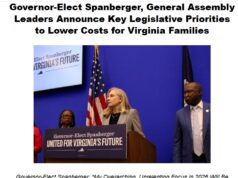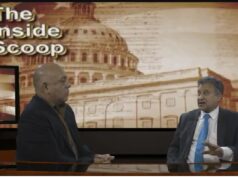On Tuesday, June 11, Virginia State Senate Democratic Leader Dick Saslaw – in spite of outspending his two Democratic primary opponents by approximately a 5:1 (!) margin, and in spite of having represented his Senate district since 1980 (also !!!) – barely squeaked by to a win in the SD35 primary, with just 48.6% of the vote, to a combined 51.4% combined for Yasmine Taeb (45.8%) and Karen Torrent (5.6%). One could even argue, plausibly in my view, that if Torrent hadn’t been in the race, Saslaw would have lost to Taeb. Also note that both Taeb and Torrent ran to Saslaw’s “left,” both in terms of progressive and environmental policy, which means that the majority of voters appear to have preferred what Taeb/Torrent were offering.
In the end, when given a choice in a primary – which they hadn’t been in…forever, basically – more SD35 Democratic primary voters opted for “not Dick Saslaw” than for Dick Saslaw. And again, that was in spite of Saslaw outspending his opponents 5:1, and in spite of his opponents most certainly *not* running well-oiled campaigns (quite the contrary, from everything I’ve heard, including from strong Taeb supporters). Which means that SD35 Democratic primary voters clearly aren’t thrilled with Saslaw, whether it’s because he’s been there forever, because every year that goes by he looks less and less like the district he purports to represent in the State Senate, and/or because of significant policy differences on issues from Dominion Energy, criminal justice, ethics, the climate crisis and moving Virginia from fossil fuels to a clean energy economy, cracking down on payday lenders, etc, etc.
The question is, will Saslaw’s razor-close encounter with the end of his 40-plus-year political career, at the hands of his district’s Democratic voters and two underfunded opponents, have any impact on how Saslaw and the Senate Democratic Caucus behave going forward? Will Saslaw’s near loss be taken to heart by Saslaw himself and/or by other members of the Senate Democratic Caucus? Will Saslaw’s 48.6% showing on Tuesday, June 11, resonate beyond that primary, or will it quickly fade in memory and in significance? In short, how big a deal was Saslaw’s near-defeat on June 11 – and how big a deal *should* it be?
On the first question, I don’t think we can really know at this point. In talking to people, I’ve gotten mixed views, from some who think Saslaw’s near-loss will definitely have a significant impact going forward, to those who think Saslaw will never change, and that the Senate Democratic Caucus isn’t likely to change much either.
Of course, it’s quite possible that we’re going to get several new members – John Bell? Ghazala Hashmi? Debra Rodman? Cheryl Turpin? Missy Cotter Smasal? Amanda Pohl? Amy Laufer? – of the Senate Democratic Caucus this coming January, and that this could shift the caucus at least somewhat in the progressive, “good government” and environmental directions. So that alone might push Saslaw to be better than he’s been for most of his career. And, significantly, if Democrats take back control of the Virginia House of Delegates, Saslaw could be on the receiving end of a slew of progressive and environmental legislation, and could come under significant pressure – and criticism – if he and his caucus are seen as blocking the will of the Democratic House of Delegates, and of course the will of the voters who elected that Democratic House of Delegates.
So in all those senses, I can definitely see various pressures pushing Saslaw and his caucus in the progressive and environmental directions. But what, specifically, about Saslaw’s close-call on June 11? Will that have a similar impact to how Republicans were influenced by the “Tea Party,” pushing them to the right and making them paranoid about future primary challenges from their right? Now, just to be clear, in no way/shape/form am I comparing mainstream, reality-based, in-the-majority-on-issue-after-issue progressives and environmentalists to the extremist, off-the-deep-end, out-of-the-mainstream, la-la-land Tea Party. But speaking strictly politically, I wonder if Senate Democrats have absorbed what just happened to Saslaw on June 11, and how easily something like that could happen to them as well if they don’t take the lead on things like getting Virginia off of fossil fuels, instituting serious ethics and campaign finance reform, etc, etc.
In the end, we really don’t know how Saslaw’s near-defeat, and the fact that he got fewer votes than two Democratic opponents running to his “left” last Tuesday, will resonate with a) Saslaw himself and b) with the Senate Democratic Caucus. But my argument is that it absolutely *should* resonate, as it seems clear that Democratic primary voters – both in SD35 and, I’d argue, in the Commonwealth and country more broadly – are *not* in the same place in many ways as Saslaw at this point. Instead, the Democratic “base” – at a time of and existential and dire climate crisis, widening income inequality, rampant corruption, abuses of power, systemic racism and the #BlackLivesMatter movement, a sexual predator in the White House and the #MeToo movement, out-of-control corporate power (at the expense of workers and the environment), etc, etc. – badly wants *change* in a progressive and environmental direction; the main questions being how quickly, broadly and deeply that change goes. Could Dick Saslaw and the Senate Democratic Caucus ignore or block all that pent-up energy for change? Perhaps. But would they really try to do that? And if so, how would the Taeb/Torrent voters of Virginia – and certainly not just in SD35 – react? Stay tuned…













![Video: Sen. Mark Warner Says Last Night, “you saw an angry old man [Trump] giving a partisan screech that doesn’t solve anything”](https://bluevirginia.us/wp-content/uploads/2025/12/warner1218-100x75.jpg)

